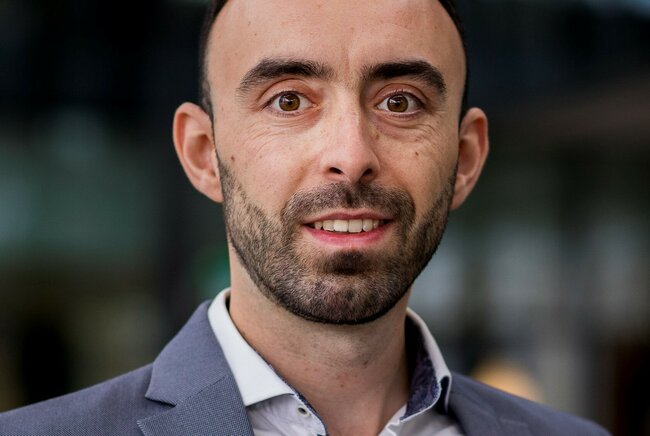Tackling complexity in smart manufacturing with advanced manufacturing process management
Konstantinos Traganos defended his thesis at the department of Industrial Engineering and Innovation Sciences on November 9th.

The transition from a traditional factory into a smart one is characterized by isolated, fragmented developments that do not solve the need for production adaptability and flexibility. This makes it difficult for production companies to harvest the benefits of the fourth industrial revolution, especially for small and medium enterprises. To help these firms, PhD researcher Konstantinos Traganos has developed a number of new methods and tools that make it easier to embrace new smart technologies in a more holistic way.
The evolution of the manufacturing paradigm has always been characterized by both market trends and technology advancements. In the ongoing fourth industrial revolution, customers demand more individual products, of high-quality and, if possible, with same-day delivery. The versatility of products and the configuration options upon ordering give rise to mass-customization and personalization.
In the context of a global business environment, in which the competition is extremely high and the changes can be disruptive (such as pandemics and the energy crisis), this market shift puts pressure on manufacturers who seek for flexibility to satisfy the demands. They have to adapt and reconfigure their systems in order to offer the product variety within short lead times and be responsive to changes.
Variety, complexity and flexibility
Typically, product variety introduces production variety that often comes with a high degree of complexity. On the other hand, the recent technology developments offer more flexibility in production operations. Versatile robots can perform various operations. Collaborative robots (cobots) increase efficiency by allowing robots and human operators to work together.
Augmented Reality (AR) systems support operators in their daily tasks, which are getting more complex. Automated guided vehicles (AGV) transport material and products around a factory, without human intervention. Smart sensors gather any kind of values from devices that help in predictive maintenance or decision making. And all these developments are leveraged by the connectivity that the Internet-of-Things (IoT) and cloud computing provide.
However, the transition from a traditional factory into a smart one is typically achieved in stages, resulting, often, in isolated, fragmented developments that do not solve the need for production adaptability and flexibility. All changes result in a general complexity problem in manufacturing operations, impeding manufacturers, especially small and medium enterprises, to harvest the Industry 4.0 benefits.
Tackling operations complexity
For his PhD research Traganos aimed to provide support in tackling operations complexity with process management theories and techniques.
The generated prescriptive knowledge helps practitioners to: 1) model complex production scenarios that satisfy challenging demand requirements and involve heterogeneous actors, 2) provide structured guidance in response to unexpected changes and events, and 3) automate their entire processes by orchestrating the activities of humans and latest robotics.
The application of advanced manufacturing process management enables process efficiency, better transparency and process overview, and optimal resource utilization.
The developments have been successfully demonstrated at various companies across Europe, as part of three European research and development projects. This has proved not only that the methods and tools work, but also generated useful insights on the management of smart manufacturing processes. As a result manufacturers in sectors such as automotive, industrial equipment and industrial printing will be able to embrace new smart technologies in a more holistic approach rather than ad-hoc and narrow developments.
Title of PhD thesis: Tackling Complexity in Smart Manufacturing with Advanced Manufacturing Process Management; Supervisors: Paul Grefen and Irene Vanderfeesten